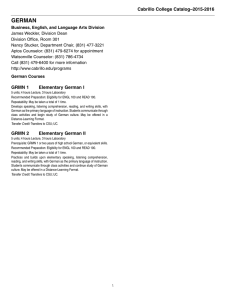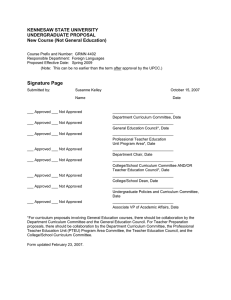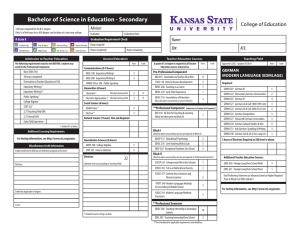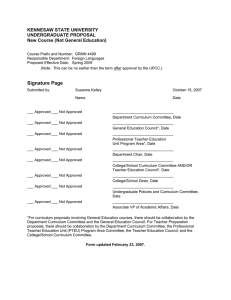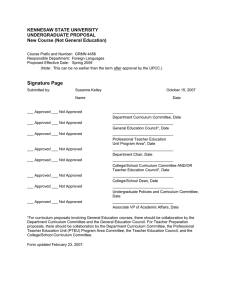KENNESAW STATE UNIVERSITY UNDERGRADUATE PROPOSAL New Course (Not General Education)
advertisement
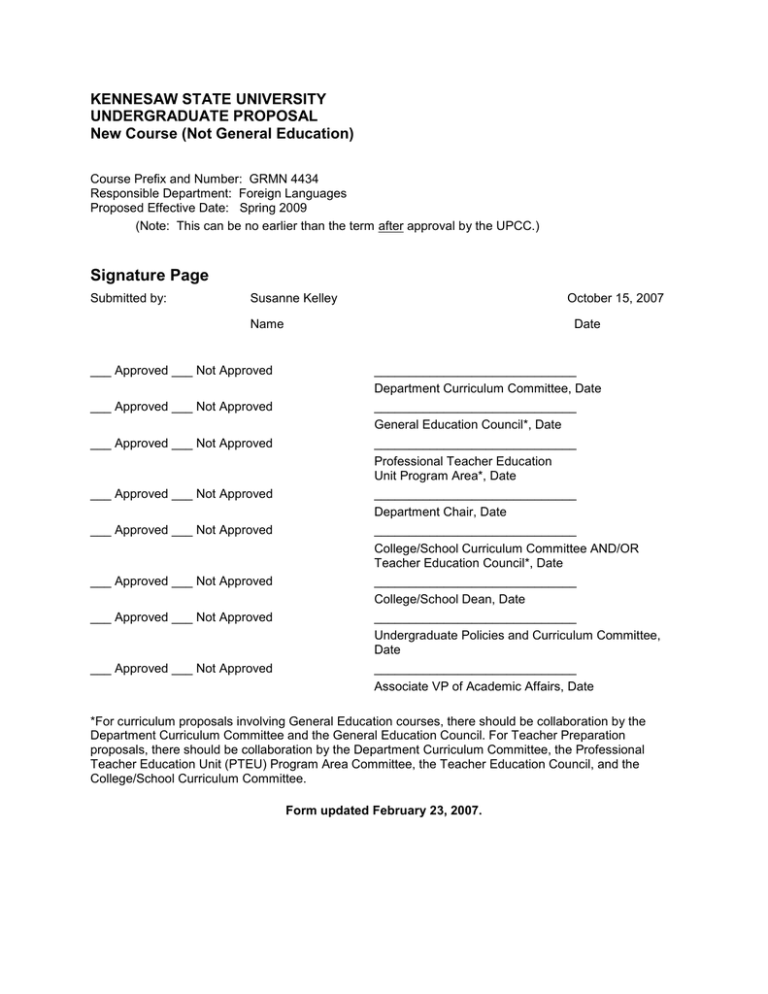
KENNESAW STATE UNIVERSITY UNDERGRADUATE PROPOSAL New Course (Not General Education) Course Prefix and Number: GRMN 4434 Responsible Department: Foreign Languages Proposed Effective Date: Spring 2009 (Note: This can be no earlier than the term after approval by the UPCC.) Signature Page Submitted by: Susanne Kelley October 15, 2007 Name ___ Approved ___ Not Approved ___ Approved ___ Not Approved ___ Approved ___ Not Approved ___ Approved ___ Not Approved ___ Approved ___ Not Approved ___ Approved ___ Not Approved ___ Approved ___ Not Approved ___ Approved ___ Not Approved Date _____________________________ Department Curriculum Committee, Date _____________________________ General Education Council*, Date _____________________________ Professional Teacher Education Unit Program Area*, Date _____________________________ Department Chair, Date _____________________________ College/School Curriculum Committee AND/OR Teacher Education Council*, Date _____________________________ College/School Dean, Date _____________________________ Undergraduate Policies and Curriculum Committee, Date _____________________________ Associate VP of Academic Affairs, Date *For curriculum proposals involving General Education courses, there should be collaboration by the Department Curriculum Committee and the General Education Council. For Teacher Preparation proposals, there should be collaboration by the Department Curriculum Committee, the Professional Teacher Education Unit (PTEU) Program Area Committee, the Teacher Education Council, and the College/School Curriculum Committee. Form updated February 23, 2007. KENNESAW STATE UNIVERSITY UNDERGRADUATE PROPOSAL New Course (Not General Education) I. Proposed Information Course Prefix and Number: GRMN 4434 Course Title: Topics in Language, Literature, and Culture Credit Hours (format should be # - # - #): 3-0-3 Prerequisites: GRMN 3304 or GRMN 3305 or permission by instructor (Prerequisites are courses or requirements that non-negotiable and must be successfully completed by any student before enrolling in the course or program under consideration. Corequisites are courses that can be taken before or in the same semester as the course under consideration. Courses at the upper-division level will require lower-division competencies or prerequisites.) Course Description for the Catalog: This course explores a period, movement or genre in literature, a topic in culture, or language-related issues. Topics are chosen for their significance and impact on German-speaking cultures. The course is taught in German. II. Justification for Course A. Explain assessment findings which led to course development. Upper-division courses as GRMN 4434 are necessary for students to develop the ACTFL proficiency rating of Advanced Low. It services students with rising proficiency levels and addresses increasing enrollment in German Studies. This course is also necessary for German Studies to maintain its congruency with the courses offered in French and Spanish within the Modern Language & Culture program. B. Explain for Prerequisites: 1. What is the substance of content in each prerequisite that commands its inclusion as a prerequisite to the proposed course? GRMN 3304 and GRMN 3305 are courses that introduce students to literary, artistic, and cultural movements over the last one thousand years. Students learn to discuss, analyze, and differentiate these movements. This basic knowledge is essential for students to be successful in a genre-focused course such as GRMN 4434. 2. What is the desired sequence of prerequisites? NA 3. What is the rationale for requiring the above sequence of prerequisites? NA 4. How often are the required prerequisites offered? As appropriate/once per academic year C. Give any other justification for the course. NA II. Additional Information A. Where does this course fit sequentially and philosophically within the program of study. This course is intended for students who have completed the bridge courses from language skill acquisition to content-focused courses. This course is primarily for students intending to major in Modern Language & Culture with German as the primary language. B. What efforts have been made to ensure that this course does not duplicate the content of other college courses with similar titles, purposes, or content? This course is unique to the Department of Foreign Languages. Because it is conducted in German and emphasizes content of the German-speaking world, it does not duplicate any other college course. C. Where will the course be located in the program (elective, required in Area F, required or elective for the major)? Indicate and justify its placement in the curriculum. This course will be required for the major. D. How often will this course be offered? As appropriate/once every other academic year E. All sections of the course will be taught with the understanding that the following apply: 1. Purpose of the course Through the use of selected readings, students will engage in a thorough examination of a specific topic in German language, literature, and culture. Students will practice thinking, speaking, and writing critically during their in-depth study of the topic. 2. Objectives of the course In this course, students refine their reading, writing, and speaking skills in German and learn in-depth analysis of a specific topic through various texts. Materials will include short stories, excerpts from novels, and articles. Students will analyze and expand on the readings in writing and orally through conversations, dialogues, and a formal presentation. 3. Course content In this course students will read and interpret texts about a selected topic ranging from the 18th to the 21st centuries. F. What instructional methodologies will be incorporated into the course to stimulate group process, writing skills, multiculturalism, and educational outcomes? A variety of methodologies will be incorporated into the course. These include use of technology, group work, oral presentations on multicultural topics, written production which includes a research project, written summaries and content analysis of readings. G. Outline the plan for continuous course assessment. What are the department, school, college, or professional standards which will be used for the assessment? How will it be determined that the course is current, meeting the educational needs of students and responsive to educational standards? How often will the course assessment be done by the department? The course will be assessed on a regular basis in end-semester student evaluations. All courses offered in German Studies are consistent with the principles, professional standards, and learning objectives identified by the KSU Department of Foreign Languages and by the American Council on the Teaching of Foreign Languages (ACTFL). Assessment tools for student progress will include the following: Compositions Oral presentations Research project Final exam H. Required Syllabus Contents (See Faculty Handbook, page 3.10 for details about KSU syllabi). 1. Course Prefix Number and Title see attached syllabus 2. Instructor: a. Office: b. Telephone: 3. Learning Objectives 4. Text(s) 5. Course Requirements/Assignments 6. Evaluation and Grading 7. Weekly Schedule of Topics 8. Academic Honesty Statement 9. Attendance Policy II. Resources and Funding Required A. What resources will be redirected to accommodate this course? NA A. Explain what items will cause additional cost to the department/school/college PersonnelNA Computer TechnologyNA Library resourcesNA EquipmentNA SpaceNA IV. COURSE MASTER FORM This form will be completed by the requesting department and will be sent to the Office of the Registrar once the course has been approved by the Office of the President. The form is required for all new courses. DISCIPLINE: GRMN COURSE NUMBER: 4434 COURSE TITLE FOR LABEL: Topics in Language, Literature, and Culture (Note: Limit 30 spaces) CLASS-LAB-CREDIT HOURS: 3-0-3 Approval, Effective Semester: Spring 2009 (Note: This can be no earlier than the term after approval by the UPCC.) Grades Allowed (Regular or S/U): Regular If course used to satisfy CPC, what areas? Learning Support Programs courses which are required as prerequisites: APPROVED: _______________________________________________________________________ Vice President for Academic Affairs or Designee Kennesaw State University Department of Foreign Languages (www.kennesaw.edu/foreign_lang) Spring 2009 GRMN 4434 Section 01 Topics in Language Literature and Culture: Traveling through the Centuries Instructor: Dr. Susanne Kelley Office: PS 254 Office phone: 678-797-2383 Office hours: tba E-mail: skelle16@kennesaw.edu Textbooks: Ketterer, Julia. Nichts wie hin. Reisen in Metropolen. Ein Lesebuch. Frankfurt am Main: Suhrkamp, 2003. All other texts are posted on the Web: Goethe, Italienische Reise Heine, Deutschland. Ein Wintermärchen Hofmannsthal, Der Wanderer Any standard College Dictionary English-German/German-English Catalog Description: This course explores a period, movement or genre in literature, a topic in culture, or languagerelated issues. Topics are chosen for their significance and impact on German-speaking cultures. The course is taught in German. Course Goals: In this course students will read and interpret German and Austrian travel texts from the 18th to the 21st centuries. The class will accompany a number of major authors on their real and fictional journeys through Germany, Europe and beyond. Students will explore the significance of travel and the impact of travel writers on German-speaking cultures. Students will practice thinking, speaking, and writing critically during their in-depth study of one topic. Course Expectations: Participation and Attendance: Classroom activities are mainly concerned with the acquisition of active communication skills, which means that students will frequently prepare oral and written assignments in pairs and groups (speaking and writing only German). Class will begin on time. Punctual attendance is mandatory and absolutely essential. Students are expected to attend all classes. The maximum number of absences is three. All absences, excused or unexcused, will be counted as absences. Each additional absence over the maximum will result in your final grade being lowered by 3%. If students must be absent from class, it is their responsibility to find out what the assignment was for that day and to turn homework in on time. Assignments and Tests: Assignments cannot be made up, except in cases of documented family or medical emergencies. Students must submit homework on the day it is due. Students are expected to be able to respond to homework assignments orally as well. Papers: Students will turn in three shorter papers of 2-3 pages each throughout the semester. Each of these papers will be revised after engaging in a peer review process. The final paper consists of 5-7 pages and is due the last class of the semester. This paper should be based on one of the shorter papers. It must include a bibliography of at least 5 items. Presentations: Students will regularly give short presentations. At least one of those presentations must be an interpretation of one of the texts covered in class. Others may be on an author, literary genre, literary and historic period, etc. Evaluation: 3 short essays Assignment Portfolio Presentations Final Paper Oral Assessment 100 points each 200 points 100 points 250 points 150 points 30% 20% 10% 25% 15% Total 1000 points 100% Grading Scale: 100-90%=A; 89-80%=B; 79-70%=C; 69-60%=D; 59% and below=F Criteria for evaluation of speaking: (a) Vocabulary (use of words in context; variety) (b) Pronunciation (pronunciation is accurate enough so as not to interfere with comprehension) (c) Fluency (hesitation in speech production does not alter the message) (d) Accuracy (grammatical mistakes are limited) (e) Creativity (speech production includes some elements of a story line; use of some circumlocutions) Criteria for evaluation of writing: (a) Content (argument is clearly defined; ideas are well connected, clearly presented, and supported by examples; conclusion wraps up the argument without repeating it) (b) Vocabulary (use of words in context; variety) (c) Organization (argument, ideas, and conclusion are well structured; correct use of transitional sentences) (d) Accuracy (appropriate use of grammatical structures) (e) Creativity (use of complex sentences; varied syntax) Student Learning Outcomes This course will contribute to the attainment of the following general (GSLO) and specific (SSLO) student learning outcomes of the B.A. in Modern Language & Culture (ML&C): GSLO ML&C 1: LANGUAGE, LINGUISTICS, & COMPARISONS Learners are proficient in using the target language, are familiar with the target language system, and seek opportunities to further develop their skills and knowledge. (Knowledge, Skills, Attitudes) SSLO ML&C 1.a.: Demonstrating Language Proficiency. Learners demonstrate a high level of proficiency in the target language, and they seek opportunities to strengthen their proficiency. (Knowledge, Skills, Attitudes) To address this outcome, learners will read a variety of short stories within the genre of travel literature improve their oral skills by participating in on-going class discussions about the readings and associated topics covered in the course improve their writing skills by writing and revising three essays of increasing difficulty as well as a final researched paper. complete written homework assignments throughout the semester. deliver two or more short oral presentations introducing an author, text, or topic. Assessment: Evaluation of three essays in their original and revised versions. Evaluation of final research paper. Weekly evaluation of written homework assignments. Evaluation of oral presentations. GSLO ML&C 2: CULTURES & LITERATURES Learners know the literature and culture of the target language countries. They use this knowledge to interpret and reflect upon the perspectives of the target culture in relation to its practices and products. (Knowledge, Skills, Attitudes) SSLO ML&C 2.a.: Demonstrating Cultural Understandings. Learners demonstrate that they understand the connections among the perspectives of a culture and its practices and products. (Knowledge, Skills) To address this outcome, learners will read, study, and analyze short stories ranging from the 18th to the 21st centuries. research information on selected topics related to the course content and report the results to the class. Assessment: Evaluation of literary and cultural analysis in the short and long papers. Evaluation of oral presentations. SSLO ML&C 2.b.: Demonstrating Understanding of Literary and Cultural Texts and Traditions. Learners recognize the value and role of literary and cultural texts and use them to interpret and reflect upon the perspectives of the target cultures over time. (Knowledge, Skills, Attitudes) To address this outcome, learners will read and study the genre of travel literature by reading a variety of short stories ranging from the 18th to the 21st centuries. Assessment: Evaluation of learner’s written and oral analysis and understanding of the material and topic covered. Academic honesty statement: Every KSU student is responsible for upholding the provisions of the Student Code of Conduct, as published in the Undergraduate and Graduate Catalogs. Section ii of the Student Code of Conduct addresses the University’s policy on academic honesty, including provisions regarding plagiarism and cheating, unauthorized access to University materials, misrepresentation/falsification of university records or academic work, malicious removal, retention, or destruction of library materials, malicious/intentional misuse of computer facilities and/or services, and misuse of student identification cards. Incidents of alleged academic misconduct will be handled through the established procedures of the University Judiciary Program, which includes either an “informal” resolution by a faculty member, resulting in grade adjustment, or a formal hearing procedure, which may subject a student to the Code of Conduct’s minimum one semester suspension requirement. Disability Policy: Kennesaw State University provides program accessibility and reasonable accommodations for persons identified as disabled under Section 504 of the Rehabilitation Act of 1973 or the Americans with Disabilities Act of 1990. A number of services are available to help disabled students with their academic work. In order to make arrangements for special services, students must visit the Office of Disabled Student Support Services (ext. 6443) and arrange an individual assistance plan. In some cases, certification of disability is required. TENTATIVE CLASS SCHEDULE GRMN 4434 – Spring 2009 Week 1 Course Introduction / What is travel literature? Week 2 18th Century/Travel to Italy: Goethe, Italienische Reise Week 3 18th Century/Travel to Italy: Goethe, Italienische Reise Week 4 Travel Poems from the 18th to 20th centuries Week 5 19th Century/Travel through Germany: Heine, Deutschland. Ein Wintermärchen Week 6 19th Century/Travel through Germany : Heine, Deutschland. Ein Wintermärchen Week 7 Fin-de-Siècle/Travel to Greece: Hofmannsthal, Der Wanderer Week 8 Fin-de-Siècle/Travel to Greece: Hofmannsthal, Der Wanderer Week 9 Early 20th Century/Travel to Spain: Fleißer, Katalanisches Karussell 1930 Week 10 Contemporary Austrian/Travel through Vienna: Bachmann, Besichtigung einer Stadt Week 11 Contemporary West-German/Travel to Berlin: Heidenreich, Kleine Reise Week 12 Contemporary North-East German/Travel to New York: Treichel, Das ist die Brooklyn Bridge Week 13 Contemporary East-German/Travel to Thailand: Askan, Der lächelnde Buddha Week 14 Contemporary German/Travel to Barcelona: Borowiak, Welch Metropole! Week 15 Film: Im Juli Week 16 Review
